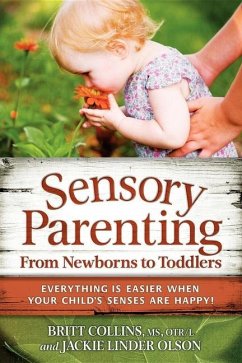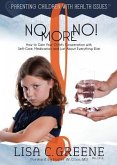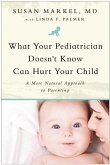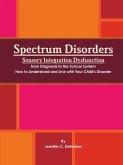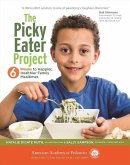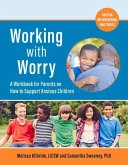Britt Collins, Jackie Linder Olson
Sensory Parenting, from Newborns to Toddlers
Everything Is Easier When Your Child's Senses Are Happy!
Schade – dieser Artikel ist leider ausverkauft. Sobald wir wissen, ob und wann der Artikel wieder verfügbar ist, informieren wir Sie an dieser Stelle.
Britt Collins, Jackie Linder Olson
Sensory Parenting, from Newborns to Toddlers
Everything Is Easier When Your Child's Senses Are Happy!
- Broschiertes Buch
- Merkliste
- Auf die Merkliste
- Bewerten Bewerten
- Teilen
- Produkt teilen
- Produkterinnerung
- Produkterinnerung
An occupational therapist-and-parent team has organized and combined parenting information along with sensory integration methods, tips and solutions. They explain the underlying reasons for a child's negative behaviors and offer simple fixes.
Andere Kunden interessierten sich auch für
![No More No! How to Gain Your Child's Cooperation with Self-Care, Medication and Just About Everything Else No More No! How to Gain Your Child's Cooperation with Self-Care, Medication and Just About Everything Else]() Lisa C. GreeneNo More No! How to Gain Your Child's Cooperation with Self-Care, Medication and Just About Everything Else8,99 €
Lisa C. GreeneNo More No! How to Gain Your Child's Cooperation with Self-Care, Medication and Just About Everything Else8,99 €![What Your Pediatrician Doesn't Know Can Hurt Your Child What Your Pediatrician Doesn't Know Can Hurt Your Child]() Susan MarkelWhat Your Pediatrician Doesn't Know Can Hurt Your Child12,99 €
Susan MarkelWhat Your Pediatrician Doesn't Know Can Hurt Your Child12,99 €![Spectrum Disorders Sensory Integration Dysfunction from Diagnosis to the School System How to Understand and Live with Your Child's Disorder Spectrum Disorders Sensory Integration Dysfunction from Diagnosis to the School System How to Understand and Live with Your Child's Disorder]() Jennifer DehmlowSpectrum Disorders Sensory Integration Dysfunction from Diagnosis to the School System How to Understand and Live with Your Child's Disorder20,99 €
Jennifer DehmlowSpectrum Disorders Sensory Integration Dysfunction from Diagnosis to the School System How to Understand and Live with Your Child's Disorder20,99 €![The Picky Eater Project: 6 Weeks to Happier, Healthier, Family Mealtimes The Picky Eater Project: 6 Weeks to Happier, Healthier, Family Mealtimes]() Natalie Digate MuthThe Picky Eater Project: 6 Weeks to Happier, Healthier, Family Mealtimes16,99 €
Natalie Digate MuthThe Picky Eater Project: 6 Weeks to Happier, Healthier, Family Mealtimes16,99 €![Working with Worry: A Workbook for Parents on How to Support Anxious Children Working with Worry: A Workbook for Parents on How to Support Anxious Children]() Melissa L. KilbrideWorking with Worry: A Workbook for Parents on How to Support Anxious Children13,99 €
Melissa L. KilbrideWorking with Worry: A Workbook for Parents on How to Support Anxious Children13,99 €
An occupational therapist-and-parent team has organized and combined parenting information along with sensory integration methods, tips and solutions. They explain the underlying reasons for a child's negative behaviors and offer simple fixes.
Produktdetails
- Produktdetails
- Verlag: Future Horizons
- Seitenzahl: 317
- Erscheinungstermin: 1. Oktober 2010
- Englisch
- Abmessung: 228mm x 151mm x 25mm
- Gewicht: 525g
- ISBN-13: 9781935567226
- ISBN-10: 1935567225
- Artikelnr.: 29378725
- Herstellerkennzeichnung
- Libri GmbH
- Europaallee 1
- 36244 Bad Hersfeld
- gpsr@libri.de
- Verlag: Future Horizons
- Seitenzahl: 317
- Erscheinungstermin: 1. Oktober 2010
- Englisch
- Abmessung: 228mm x 151mm x 25mm
- Gewicht: 525g
- ISBN-13: 9781935567226
- ISBN-10: 1935567225
- Artikelnr.: 29378725
- Herstellerkennzeichnung
- Libri GmbH
- Europaallee 1
- 36244 Bad Hersfeld
- gpsr@libri.de
Britt Collins, M.S., OTR/L (Pediatric Occupational Therapist) and Jackie Olson (Mother) have created and written a series of Occupational Therapy DVDs for children with autism and other special needs, www.TRPwellness.com, winning an iParenting Award for Outstanding Product 2008. They write and provide on-air talent to a monthly radio show for Autism One Radio and have spoken at conferences across the United States on the benefits of Occupational Therapy and Sensory Integration in the home, school, and community. Miss Collins has had articles published in Autism File and Charlotte Parent, while Mrs. Olson has written articles for Mommytalk.com, an excerpt in the book "Vision Boards; The Secret to an Extraordinary Life" and penned the screenplay "The Caretaker" starring Jennifer Tilly and Judd Nelson (2008). Having such positive results in the niche special needs market, this duo is riding the mainstream wave of typical child parenting by popular demand. Britt and Jackie's article on the benefits of playing the Wii have created a buzz and are garnering them attention as game gurus. Their press interviews and reviews of their DVDs have been featured in First Magazine, Library Journal, Autism Spectrum Quarterly, Fit Yoga, LA Health, Costco Connection, Vision Magazine, as well as several newspapers and websites. Britt Collins' professional experience and education: Since graduating from Colorado State University with a Masters Degree in Occupational Therapy, Britt has practiced in a variety of settings; including Sensory Integration clinics, schools, homes, rehabilitation, and skilled nursing facilities. Britt honed her Occupational Therapist skills at a pediatric clinic in Tarzana, California prior to working for Pedia Staff in the Battle Ground, Washington school district where she oversaw 2 elementary schools and the middle school and high school. Britt has mainly focused her career as an OT on Sensory Integration and how this affects children with various special needs, such as autism, ADHD, Sensory Dysfunction and more. She is a member of The American Occupational Therapy Association (AOTA) and currently works with the Legacy Health System in Pediatric Rehabilitation and Inpatient Acute Pediatrics in Portland, Oregon. While working at a Pediatric Hospital, Britt continues her Occupational Therapy education. Most recently she completed a course in NICU and EI Feeding for Medically Fragile Children. Britt is focusing her energy on learning new techniques and types of therapy to increase her knowledge about occupational therapy, such as Hippotherapy (working with horses and children), medically fragile children in the acute phase of treatment, new evidence based practice research on sensory integration, animal-assisted therapy and much more. Jackie Linder-Olson's professional and personal experience: Jackie Olson found out upon the birth of her child that "something was wrong" and has spent the last seven years learning about sensory processing disorders to help her son and other families. As a filmmaker who started her career at Miramax Films and then 20th Century Fox, she went freelance as in independent producer to be able to spend more time with her son and help him with his sensory needs (as well as an autism diagnosis). Upon celebrating the tremendous results that her son has had with Occupational Therapist, Britt Collins, Jackie decided to combine her career and passion for OT and created a DVD series to help other parents understand their children's sensory needs. The results have been overwhelming and rewarding. Upon realizing that her son had sensory processing dysfunction, Jackie started facing her own sensory issues (mostly auditory) and has improved the quality of her own life. During the last two years, Jackie's son has been mainstreamed into a standard public school system. In this time, Jackie has noticed that many of the typically developing children have sensory issues as well. Parents who watch their DVD series who have typical kids are applying the same information to their children and so the book about parenting was born. Additional information about the authors: Jackie and Britt are a successful team due to Britt's knowledge working with kids and Jackie's efforts with her own child and other parents. Britt is very technical and lists the facts, while Jackie translates this into a language parents can easily understand and utilize. Together, Jackie and Britt have recently founded the non-profit organization Special Needs United (specialneedsunited.org) which focuses on Occupational Therapy for lower income and Spanish speaking communities that might not have as much access to these benefits. Their overall plan is to develop occupational therapy products that they take to market to insure that the organization is not dependent on charitable donations alone.
Introduction
The Seven Senses: Yes, SEVEN! Sight, Sound, Taste, Smell, Touch, Vestibular
and Proprioception. We promise you'll be speaking "Sensory Parenting" in no
time.
Chapter 1: Bringing Home Baby: Birth through 6 months
a) Decorating the Nursery keeping Baby's sensory needs in mind
b) Baby Activities: bathing, changing, feeding, play, sleep, and all things
baby
c) Baby Milestones: what to look for from an OT and sensory perspective
Chapter 2: Baby: 6 months to turning two
a) Baby Activities: crawling, walking, feeding and weaning
b) PLAY
c) More Milestones: Keep em' coming
Chapter 3: Toddler Time
a) Your two-year-old - not so terrible
b) ABA (Applied Behavior Analysis): Do try this at home!
c) Senses, behaviors and just being two and three-years-old
d) Social skills - being friends is hard work
e) Every day outings from your toddler's point-of-view (a sandy diaper
can't feel good)
Chapter 4: Four is Fun and the big Five-O
a) Are YOU listening? How to talk to your child so that they hear you
b) How to make every day situations great! Or as great as possible
c) PLAY that's good for you: Video games, computer games, board games, oh
and playing outside!
d) Pre-school and Kindergarten
e) Sensory sensitive kiddos go to the dentist and doctor
Chapter 5: Common Parenting Questions and Answers
a) Picky Eaters - oral aversion, oral motor skills, and you want me to eat
what?
b) Redirecting Energy - eliminate HALF your battles
c) Choices: my way or my way
Chapter 6: Extreme cases - is your baby/child hyper or hypo sensitive?
a) A complete checklist
b) What to do? Who can help? Where to turn?
c) Will he/she grow out of it? What if I ignore it?
d) Does my child have autism? A developmental disability?
Glossary
References
The Seven Senses: Yes, SEVEN! Sight, Sound, Taste, Smell, Touch, Vestibular
and Proprioception. We promise you'll be speaking "Sensory Parenting" in no
time.
Chapter 1: Bringing Home Baby: Birth through 6 months
a) Decorating the Nursery keeping Baby's sensory needs in mind
b) Baby Activities: bathing, changing, feeding, play, sleep, and all things
baby
c) Baby Milestones: what to look for from an OT and sensory perspective
Chapter 2: Baby: 6 months to turning two
a) Baby Activities: crawling, walking, feeding and weaning
b) PLAY
c) More Milestones: Keep em' coming
Chapter 3: Toddler Time
a) Your two-year-old - not so terrible
b) ABA (Applied Behavior Analysis): Do try this at home!
c) Senses, behaviors and just being two and three-years-old
d) Social skills - being friends is hard work
e) Every day outings from your toddler's point-of-view (a sandy diaper
can't feel good)
Chapter 4: Four is Fun and the big Five-O
a) Are YOU listening? How to talk to your child so that they hear you
b) How to make every day situations great! Or as great as possible
c) PLAY that's good for you: Video games, computer games, board games, oh
and playing outside!
d) Pre-school and Kindergarten
e) Sensory sensitive kiddos go to the dentist and doctor
Chapter 5: Common Parenting Questions and Answers
a) Picky Eaters - oral aversion, oral motor skills, and you want me to eat
what?
b) Redirecting Energy - eliminate HALF your battles
c) Choices: my way or my way
Chapter 6: Extreme cases - is your baby/child hyper or hypo sensitive?
a) A complete checklist
b) What to do? Who can help? Where to turn?
c) Will he/she grow out of it? What if I ignore it?
d) Does my child have autism? A developmental disability?
Glossary
References
Introduction
The Seven Senses: Yes, SEVEN! Sight, Sound, Taste, Smell, Touch, Vestibular
and Proprioception. We promise you'll be speaking "Sensory Parenting" in no
time.
Chapter 1: Bringing Home Baby: Birth through 6 months
a) Decorating the Nursery keeping Baby's sensory needs in mind
b) Baby Activities: bathing, changing, feeding, play, sleep, and all things
baby
c) Baby Milestones: what to look for from an OT and sensory perspective
Chapter 2: Baby: 6 months to turning two
a) Baby Activities: crawling, walking, feeding and weaning
b) PLAY
c) More Milestones: Keep em' coming
Chapter 3: Toddler Time
a) Your two-year-old - not so terrible
b) ABA (Applied Behavior Analysis): Do try this at home!
c) Senses, behaviors and just being two and three-years-old
d) Social skills - being friends is hard work
e) Every day outings from your toddler's point-of-view (a sandy diaper
can't feel good)
Chapter 4: Four is Fun and the big Five-O
a) Are YOU listening? How to talk to your child so that they hear you
b) How to make every day situations great! Or as great as possible
c) PLAY that's good for you: Video games, computer games, board games, oh
and playing outside!
d) Pre-school and Kindergarten
e) Sensory sensitive kiddos go to the dentist and doctor
Chapter 5: Common Parenting Questions and Answers
a) Picky Eaters - oral aversion, oral motor skills, and you want me to eat
what?
b) Redirecting Energy - eliminate HALF your battles
c) Choices: my way or my way
Chapter 6: Extreme cases - is your baby/child hyper or hypo sensitive?
a) A complete checklist
b) What to do? Who can help? Where to turn?
c) Will he/she grow out of it? What if I ignore it?
d) Does my child have autism? A developmental disability?
Glossary
References
The Seven Senses: Yes, SEVEN! Sight, Sound, Taste, Smell, Touch, Vestibular
and Proprioception. We promise you'll be speaking "Sensory Parenting" in no
time.
Chapter 1: Bringing Home Baby: Birth through 6 months
a) Decorating the Nursery keeping Baby's sensory needs in mind
b) Baby Activities: bathing, changing, feeding, play, sleep, and all things
baby
c) Baby Milestones: what to look for from an OT and sensory perspective
Chapter 2: Baby: 6 months to turning two
a) Baby Activities: crawling, walking, feeding and weaning
b) PLAY
c) More Milestones: Keep em' coming
Chapter 3: Toddler Time
a) Your two-year-old - not so terrible
b) ABA (Applied Behavior Analysis): Do try this at home!
c) Senses, behaviors and just being two and three-years-old
d) Social skills - being friends is hard work
e) Every day outings from your toddler's point-of-view (a sandy diaper
can't feel good)
Chapter 4: Four is Fun and the big Five-O
a) Are YOU listening? How to talk to your child so that they hear you
b) How to make every day situations great! Or as great as possible
c) PLAY that's good for you: Video games, computer games, board games, oh
and playing outside!
d) Pre-school and Kindergarten
e) Sensory sensitive kiddos go to the dentist and doctor
Chapter 5: Common Parenting Questions and Answers
a) Picky Eaters - oral aversion, oral motor skills, and you want me to eat
what?
b) Redirecting Energy - eliminate HALF your battles
c) Choices: my way or my way
Chapter 6: Extreme cases - is your baby/child hyper or hypo sensitive?
a) A complete checklist
b) What to do? Who can help? Where to turn?
c) Will he/she grow out of it? What if I ignore it?
d) Does my child have autism? A developmental disability?
Glossary
References

